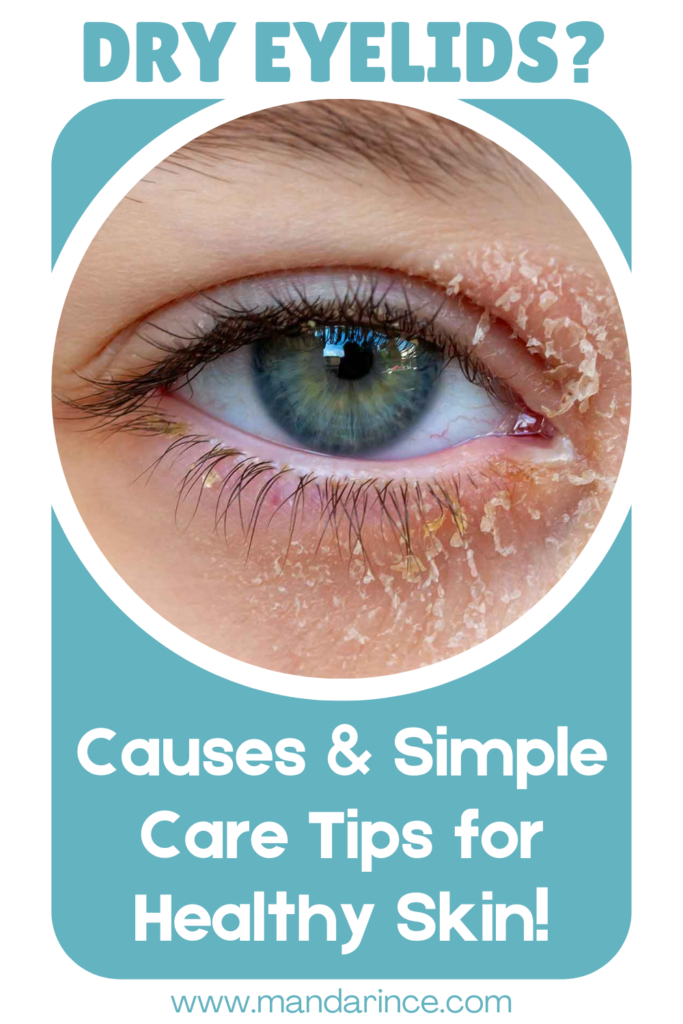Dry eyelids are often accompanied by itching, flaking, and irritation, particularly during colder months. However, various other factors can contribute to dryness beyond seasonal changes. Aging, environmental conditions, and underlying skin concerns are common causes of dry skin on the eyelids.
While dry eyelids are generally not a serious medical issue, persistent dryness can lead to discomfort and increase the risk of infections or other complications if left untreated. Proper skincare and identifying the root cause are essential for maintaining healthy eyelid skin.

What Are Dry Eyelids?
The skin on the eyelids is much thinner and more delicate compared to other parts of the body. Additionally, the area around the eyes contains numerous blood vessels, making it more prone to irritation and skin conditions.
When the eyelid skin becomes excessively dry, it may lead to cracking, flakiness, and discomfort. Various factors, including environmental influences and underlying skin conditions, can contribute to dryness. Identifying the cause is essential to prevent further irritation and maintain healthy eyelid skin.
Causes of Dry Eyelids
Dry eyelids can result from a variety of factors, ranging from aging to environmental conditions and skin disorders. Identifying the underlying cause is essential for proper management and prevention.
Aging
As the skin ages, it becomes more prone to dryness due to reduced elasticity and moisture retention. Factors such as decreased hyaluronic acid levels and a diminished supply of nutrients contribute to the thinning and roughness of eyelid skin, leading to increased dryness.
Environmental Factors
The climate you live in plays a major role in skin hydration. Dry air, cold weather, and low humidity levels can strip moisture from the skin, including the eyelids. Additionally, washing the face with hot water can further dehydrate the skin, making dryness worse.
Contact Dermatitis
Also known as contact eczema, this condition occurs when the skin reacts to allergens or irritants. Common triggers include:
- Hair products
- Makeup
- Eyelash curlers
- Face washes and sunscreens
- Moisturizers
- Dust and chlorine from swimming pools
- Poison ivy (one of the most common causes of allergic contact dermatitis in the U.S.)
Atopic Dermatitis
People with atopic eczema have naturally sensitive skin due to abnormalities in the epidermis and immune system. This can cause persistent dryness and itching. Genetic factors, environmental triggers, and food sensitivities may also contribute to this condition.
Blepharitis
This is a common inflammation of the eyelids, often caused by bacteria, rosacea, or allergies. It typically affects both eyes and presents symptoms such as:
- Burning sensation
- Irritation and tearing
- Extreme sensitivity to light (photophobia)
- Blurred vision
- Red, swollen, and scaly eyelids
Identifying and Managing Triggers
Recognizing specific triggers is key to managing dry eyelids effectively. Keeping a symptom diary can help track patterns related to environmental conditions, skincare products, or lifestyle habits. By identifying potential irritants, you can make informed decisions about product choices and lifestyle adjustments to minimize discomfort and maintain healthy eyelid skin.
Signs and Symptoms of Dry Eyelids
Some of the common symptoms of this skin condition include:
- Itchiness
- Flakiness
- Loss of eyelashes
- Eyelashes growing in the wrong direction
- Scaly and rough skin
- Painful burning
- Peeling
- Oozing and crust formation
- Chronic redness or inflammation around the eyelids
These symptoms can range from mild to severe, depending on the underlying cause. While some individuals may not experience itching, others may suffer from intense irritation. In certain cases, dry eyelids may also lead to swelling.
If you notice any of these symptoms, it is important to seek proper treatment and manage the condition early to prevent infections and further complications.
How to Treat Dry Eyelids
The treatment for dry eyelids depends on the underlying cause and severity of symptoms. Proper skincare, medical treatments, and home remedies can help alleviate discomfort and prevent further irritation.
Medical Treatments
- Hydrocortisone Cream – Over-the-counter hydrocortisone cream can help reduce inflammation and irritation caused by atopic dermatitis.
- Lubricating Eye Creams – Moisturizing creams designed for sensitive skin around the eyes can help restore hydration.
- Prescription Ointments – Medications such as Tacrolimus ointment may be recommended for severe cases of atopic dermatitis.
- Warm Compress for Blepharitis – Applying a warm compress can help soothe inflamed eyelids and loosen debris.
- Specialized Cleansers – Products like Ocusoft foam can help maintain eyelid hygiene and reduce bacterial buildup.
- Steroid Ointments – In cases of persistent inflammation, a doctor may prescribe ointments such as Tobradex.
- Antibiotics – Topical or oral antibiotics may be necessary for bacterial infections associated with blepharitis.
- Antihistamines – If allergies are the cause of dryness, antihistamines can help reduce itching and swelling.
Home Remedies
- Maintain good eyelid hygiene by gently cleaning the eyelids with a mild, fragrance-free cleanser.
- Avoid harsh skincare products or cosmetics that may trigger irritation.
- Identify allergens and environmental triggers to minimize flare-ups.
- Use a humidifier to keep the air moist, especially in dry climates or during winter.
- Apply natural soothing remedies such as aloe vera gel or cold compresses to relieve irritation.
If symptoms persist or worsen despite treatment, it is best to consult a healthcare professional for a personalized approach to managing dry eyelids effectively.
When to See a Doctor
If home remedies and over-the-counter treatments do not provide relief, it is essential to consult a doctor. Persistent dryness may indicate an underlying condition that requires medical attention.
Seek medical help if:
- Your eyelid dryness does not improve despite using treatments.
- You suspect the dryness is caused by dermatitis and need a proper diagnosis.
- The itching is severe and disrupts your sleep.
- You experience additional symptoms like swelling, redness, or pain that worsen over time.
Left untreated, dry eyelids can become a chronic issue and may lead to complications such as infection or scarring. A doctor can conduct a physical examination, identify potential triggers, and recommend a targeted treatment plan to manage the condition effectively.
